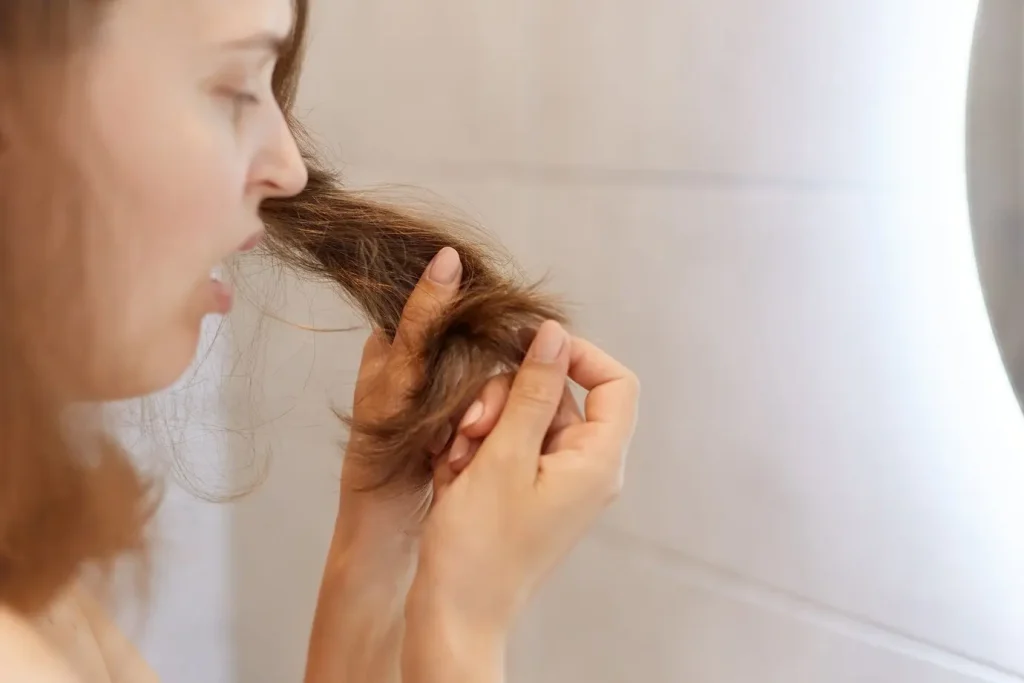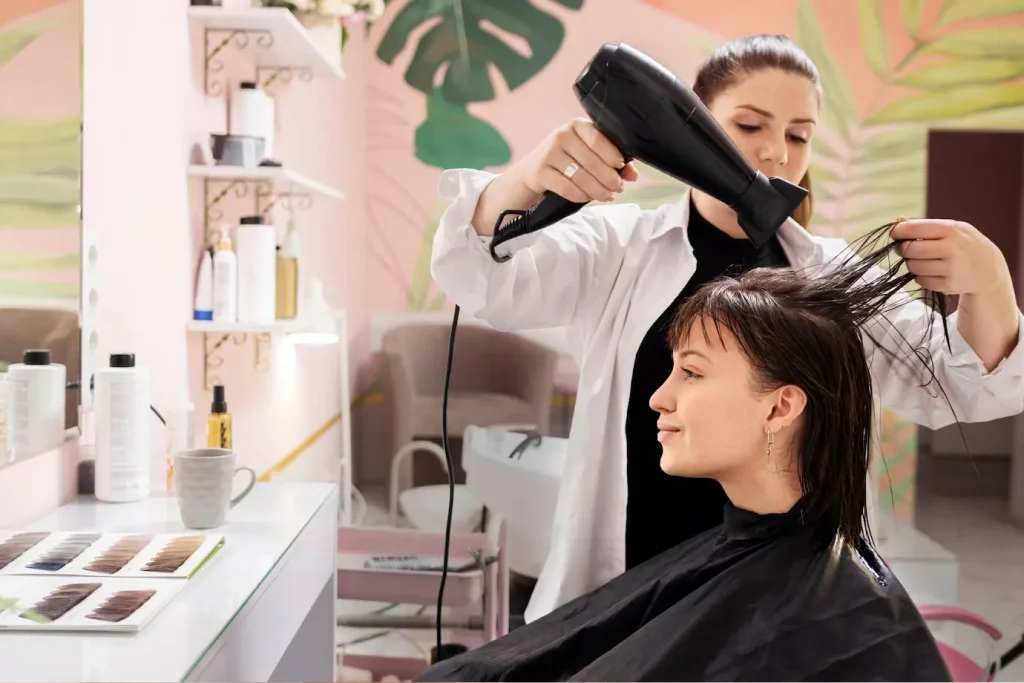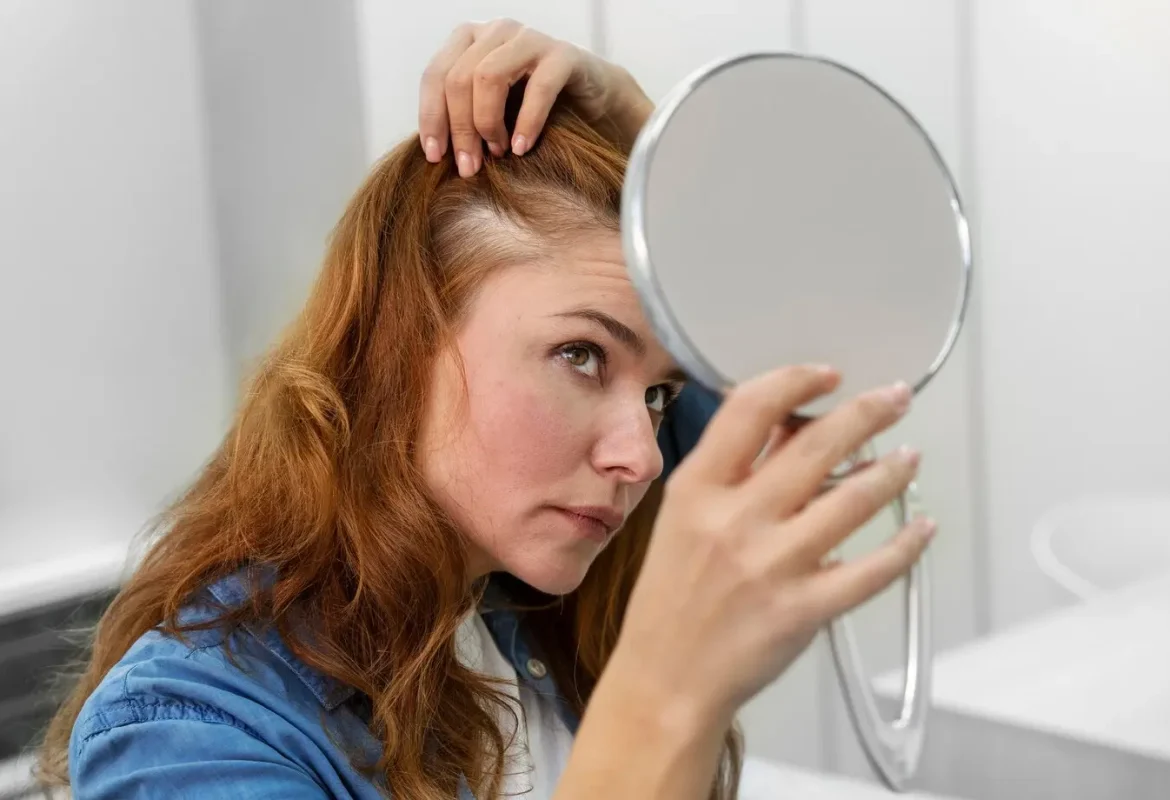As a hair care professional, I see the impact of stress on hair health all too often. Clients come to me worried about thinning hair, excessive shedding, and a general lack of lustre. While genetics and lifestyle factors play a role, chronic stress is a major culprit behind many hair woes. But there’s good news! By understanding the stress-hair loss connection and incorporating stress management techniques into your daily routine, you can take back control of your hair health.

The Hair Growth Cycle and the Stress Factor
Let’s delve into the science behind hair growth. Your hair goes through a cyclical process consisting of three phases:
- Anagen: This is the active growth phase, lasting anywhere from 2-7 years. During this time, hair follicles are actively producing new hair cells.
- Catagen: This is a transitional phase lasting a few weeks, where hair growth slows down and the follicle detaches from the blood supply.
- Telogen: This is the resting phase, lasting about 3 months, where the hair eventually sheds to make way for new growth.
Chronic stress disrupts this delicate balance. The body releases the hormone cortisol when under stress. While cortisol has its purpose in the “fight-or-flight” response, chronically elevated levels can push hair follicles prematurely into the telogen phase, resulting in excessive shedding and potential hair loss.
The Science Behind Stress-Induced Hair Loss

Research suggests several ways stress can negatively impact hair growth:
- Reduced Blood Flow: Stress can constrict blood vessels, limiting the flow of oxygen and essential nutrients to hair follicles, hindering their ability to function optimally.
- Immune System Suppression: Chronic stress weakens the immune system, making it difficult for the body to fight off infections and maintain healthy hair growth.
- Hormonal Imbalance: As mentioned earlier, elevated cortisol levels disrupt the hair growth cycle by pushing follicles prematurely into the resting phase.
Exercise: Your Ally in Stress Management and Hair Health
Now for the good news! Exercise can be a powerful tool for managing stress and potentially improving hair health. Here’s how:
- Stress Reduction: Physical activity triggers the release of endorphins, the body’s natural feel-good chemicals. Endorphins elevate mood, reduce anxiety, and improve overall well-being, effectively combatting the negative effects of chronic stress.
- Improved Blood Flow: Exercise gets your heart pumping, increasing blood circulation throughout the body, including the scalp. This ensures a steady supply of oxygen and nutrients to hair follicles, promoting healthy growth.
- Mind-Body Connection: Exercise isn’t just about physical benefits. Engaging in activities you enjoy can be a form of meditation, allowing you to de-stress, clear your mind, and improve your overall sense of well-being.
Making Exercise Work for You

The key to reaping the benefits of exercise for stress reduction and potentially improved hair health is to find activities you enjoy and incorporate them into your routine. Here are some tips:
- Variety is Key: Don’t get stuck in a rut! Mix things up with a combination of activities like brisk walking, swimming, cycling, yoga, or dancing.
- Start Small & Gradually Increase: If you’re new to exercise, begin with moderate activity for shorter durations and gradually increase intensity and duration as your fitness level improves.
- Find a Workout Buddy: Having a partner can make exercise more enjoyable and hold you accountable. Partner up with a friend, family member, or join a local fitness class.
- Make it Fun!: Choose activities you genuinely enjoy doing. If you love being outdoors, take a brisk walk in nature. If music motivates you, try a high-energy Zumba class.
Beyond Exercise: A Holistic Approach to Stress Management
While exercise is a powerful tool, a holistic approach is key to managing chronic stress. Here are some additional techniques you can explore:
- Meditation: Meditation helps quiet the mind, reduce anxiety, and improve focus.
- Deep Breathing Exercises: Taking slow, deep breaths activates the relaxation response, counteracting the body’s stress response.
- Healthy Sleep Habits: Aim for 7-8 hours of quality sleep each night. Sleep deprivation can exacerbate stress and negatively impact hair health.
- Maintain a Balanced Diet: Nourish your body with a diet rich in fruits, vegetables, whole grains, and lean protein to provide the building blocks for healthy hair growth.
- Seek Professional Help: If you’re struggling to manage chronic stress on your own, consider talking to a therapist or counsellor.
Seeking Professional Help for Optimal Hair Health
While stress management is a powerful tool for promoting healthy hair growth, sometimes additional support can be beneficial. Here’s where consulting a professional hair care specialist can make a significant difference.
A hairstylist with advanced training can assess your hair type, scalp condition, and specific hair goals. They can recommend personalised hair care routines, suggest targeted products to address concerns like”Is keratin good for straightening damaged hair?“, and offer valuable tips on styling techniques that minimise damage and promote healthy growth.
For more advanced solutions, consider consulting a salon specialising in hair restoration or hair loss prevention. If you are in Perth, Salons like Amaraa Hair often have access to cutting-edge treatments and hair care products that can further enhance your hair health journey. Their team of highly skilled and certified hair technicians, led by industry expert Eliza Gomez, can provide expert guidance and personalised treatment plans to address specific hair concerns.
Remember, professional hair care is an investment in your overall well-being and confidence. By combining stress management techniques with the expertise of a reputable hair care professional, you can achieve your healthiest, most beautiful hair yet.

Taking Action for Healthier Hair
Here are some actionable steps you can take to address stress-related hair loss:
- Consult a Dermatologist: If you’re experiencing significant hair loss, it’s important to rule out any underlying medical conditions. A dermatologist can assess your scalp health, diagnose the cause of hair loss, and recommend appropriate treatment options.
- Maintain a Healthy Scalp: A healthy scalp provides a fertile ground for hair growth. Use gentle shampoos and conditioners suited for your hair type. Avoid harsh chemicals, excessive heat styling, and tight hairstyles that can damage hair follicles.
- Scalp Massages: Regular scalp massages can improve blood circulation to the scalp, promoting hair growth. You can give yourself a scalp massage while shampooing or use a scalp massager tool.
- Dietary Support: Ensure your diet provides essential nutrients for healthy hair growth, such as iron, biotin, vitamin D, and omega-3 fatty acids. Consider incorporating foods rich in these nutrients or talk to your doctor about potential supplements.
Conclusion
Stress can take a toll on your overall well-being, including your hair health. However, by understanding the science behind stress-induced hair loss and incorporating stress management techniques into your daily routine, you can take back control. Remember, a holistic approach that combines stress reduction, healthy habits, and professional hair care (like the services offered at Amaraa Hair) is key to achieving and maintaining healthy, beautiful hair.
Embrace a stress-free lifestyle and watch your hair flourish!




